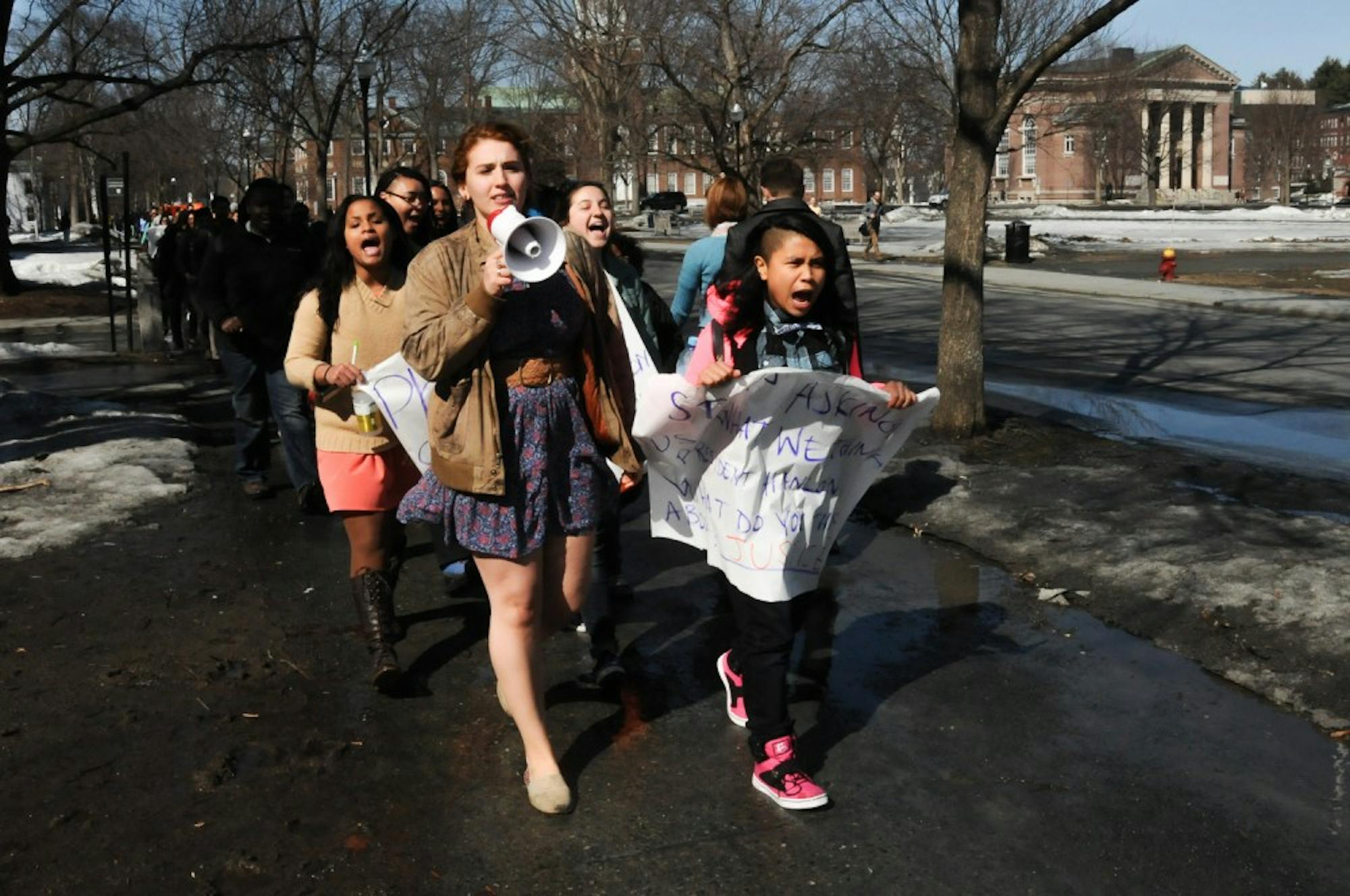A group of about 75 people gathered in front of Parkhurst Hall Wednesday afternoon to protest College President Phil Hanlon’s March 6 response to the “Freedom Budget,” a student-authored document listing over 70 demands for “transformative justice.”
The group chanted as it marched.
“What do we want?”
“A response!”
“When do we want it?”
“Now!”
Protesters marched around campus, circling the Green and walking through the library. As of press time, 19 students planned to spend Wednesday night in Hanlon’s office, continuing a sit-in that began Tuesday afternoon.
The night before, eight students slept in Hanlon’s office, while others slept in the Parkhurst atrium. A campus-wide email sent by The Dartmouth Radical at around 10 a.m. Wednesday said that protesters “will not leave until the president provides a point-by-point response to each item in the Budget.”
Hanlon entered his office at around 1 p.m. Wednesday and spoke to the group, which numbered around 20 students.
“I challenge you to take a more conservative approach if you really want to bring about change,” Hanlon said. “Demands, threats, disrupting the work of others — that’s not the way to do it.”
Shortly afterward, Hanlon sent a campus-wide email with the subject line “Working Together.” The email echoed his statement to the sit-in protestors, arguing that their methods were ill-suited for their cause.
The College, he said, will undertake a campus-wide climate survey, as previously recommended by the Committee on Student Safety and Accountability. Hanlon cited Moving Dartmouth Forward, Improve Dartmouth and his office hours as ways to “foster dialogue and advocate change.”
Some students interviewed were upset by Hanlon’s campus-wide email, believing it too quickly discounted students’ call for change.
“I wasn’t sure if I was going to come, but after President Hanlon’s email, I realized that he is not taking us seriously,” said Crystal Ye ’14 at the protest Wednesday afternoon.
The group marched around the Green, holding banners that read, “meet our demands” and “point by point.” They walked into Novack Cafe, traveled through the library and returned to Parkhurst.
Dondei Dean ’17 then asked the crowd whether students are only welcome at the College when they engage in civil discourse.
“Consider the ways that you can be welcoming to people by listening to them, no matter how they say the things they need to say,” Dean said.
Around 20 students stood on the steps of Parkhurst, passing a microphone from person to person, interspersing comments with “no justice, no peace” chants.
“Every single time one of you makes an ignorant, racist, sexist or homophobic comment to me or anyone else on this campus, you are diminishing the value of my education,” Semarley Jarrett ’14 said.
Jeremy Whitaker ’15 performed spoken-word poetry, Ye sang and Elise Wien ’17 read a poem she wrote during the sit-in. After almost an hour of protest, Celeste Winston ’14 asked supporters to supply food, clothing and water to the students remaining in Hanlon’s office.
“Please help us keep the energy alive,” Winston said.
Many attendees said they came to show their support for the student protestors.
Oscar Friedman ’16 said though he does not agree with much of what is in the “Freedom Budget,” he wanted to demonstrate his support for the students involved.
“This is a group of people that’s disempowered, constantly marginalized academically and socially by this school,” he said. “It is important that I am here today just to listen.”
Others said they disagreed with the demonstrators’ tactics.
David Cordero ’16 said though he agreed with many points in the “Freedom Budget,” he found the demonstrators’ method disrespectful, noting that Hanlon has been in office for less than a year.
“I do feel like there should be a sense of responsibility on his behalf,” he said. “But I do not agree with their disrespectful tone.”
Geography professor Richard Wright said the protest’s demands have put Hanlon in a very difficult position.
“If he were to go line by line through that list, it would preempt many conversations and preempt the responsibility of other people in the senior team,” he said.
Jillian Mayer ’14, who has participated in the sit-in, said, however, that the group is not aiming its efforts at Hanlon personally.
“We are not anti-Hanlon,” Mayer said. “We are anti-racism and -sexism.”
Student body president Adrian Ferrari ’14 said he believes the best thing for both those who support the protestors and those who oppose them is to step back and try to understand the other side.
“If the administration actually wants students to believe that they are working on this issue, they are going to have to be involved with students in equal partnership,” Ferrari said. “I think the administration will find that the more they involve students in their effort to make change, the less discontent there will be.”
Many students and administrators interviewed agreed that protests can shift Dartmouth’s culture.
Previous demonstrations, including Occupy Dartmouth and Dartmouth Real Talk’s demonstration at the Dimensions Show last year, have changed the College’s culture, said women’s and gender studies professor Julia Rabig.
History professor Russell Rickford, who marched with students around the Green, echoed a similar sentiment, calling the sit-in an “example of political vibrancy and participation that we desperately need.”
Other students said they agreed that public demonstrations are the most effective way to incite change.
“Progress doesn’t really happen unless drastic action occurs and people are upsetting other people,” Will Jackson ’14 said. “These things are absolutely necessary.”
Sera Kwon and Charlie Rafkin contributed reporting.




